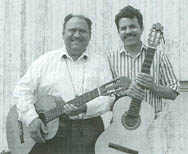

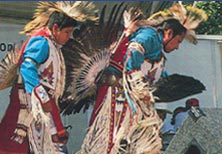
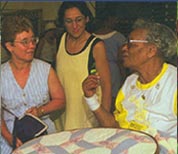

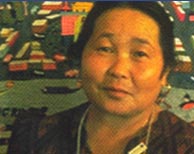
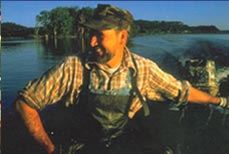
| Resources | ||||||
|
||||||
| Learning Guide |
| 1. Social Studies |
| 2. Language Arts |
| 3. Music |
| 4. Art |
| 5. Special: Multi-Disciplinary, Culminating Activities |
|
Eugenio Solís: vocals and guitar Iowa's population has been bolstered by major influxes of immigrants through- out its history. The state is recognized for a sense of " Iowa boosterism," which was first evident 150 years ago when campaigns to encourage immigrants to settle in Iowa attracted thousands to the state. The massive immigration over a relatively brief period has profoundly shaped the state's culture. Along with Czech polkas, African American spirituals, and Scandinavian string band tunes, Iowa's cultural heritage now includes dance traditions from southeast Asia and la musica folklorica de Mexico. Although Iowa was the destination of many immigrants from Mexico during the mid-1920s and 1940s, the state's Hispanic population has grown most significantly within the past twenty years. The presence of large Hispanic communities in Council Bluffs, Sioux City, Des Moines, Davenport, and other cities reveals how immigration remains an important part of the state's social dynamic. New immigrants coming to the state bring their cultural expressions with them and develop new venues for practicing their traditions, as the music of Eugenio Solis and Adalberto Solis from West Liberty shows. Eugenio and Adalberto are not related, but they share similar musical interests. Their duet was formed in the fall of 1995, when they first began playing together for services at St. Joseph's Catholic Church in West Liberty. Within six months, they found they shared interests in Mexican folk music, and they began playing secular music in restaurants and at festivals. They perform a variety of styles of music from Mexico: corridos, rancheras, cumbias, veracruzanas, and other styles of traditional and popular songs. Eugenio plays the lead guitar solos in the requinto style, and both share vocals. On both "Las Tres Mujeres" and "Maria Chuchena," Adalberto's fine talents are featured on lead vocals. Eugenio Solis was born in Sombrerete in the state of Zacatecas. He is a self-taught musician, but he grew up hearing his grandfather play violin for Matachines dances. He has been playing with a variety of bands since the age of seventeen, performing rock and roll, country music, Mexican folk songs, norteños, and virtually any kind of music in restaurants and clubs in Ciudad Juárez, El Paso, and other cities before moving to West Liberty in 1991. Adalberto Solis was born in Basconcode in the state of Sonora. He first learned to play guitar at the age of twelve, but he has only started playing regularly since moving to West Liberty in 1994. "Las Tres Mujeres" is a corrido, or a Mexican ballad. Numerous corridos commemorate events that occurred during the Mexican Revolution. A characteristic of many corridos shows up in this tune, namely that the story of the song is not explicitly spelled out in the lyrics but rather is commented upon poetically by the singer. "Maria Chuchena" is a veracruzana, or a jarocho style of folk music. As in the corrido, the lyrics imply that the audience knows the story, and the music and poetry commemorate the events described. Lyrics: Por ahí dice una leyenda que en el rancho de Cana/es/Se aparecen tres mujeres que en vida fueron rivales/Sintieron de puñaladas/Allá entre /os mesquitales. El causante de esas muertes Santos Valdés se llamaba/A /as tres por separado /es decía que /as amaba/Pero a ninguna quería/ Nada mas /as engañaba. Rosita era de /a costa de Charco Azul/María Inés Estela era de Reynosa/La más brava de las tres decía yo pierdo la vida/Antes que a Santos Va/dés. Dicen que en Laguna Seca cuando la gente pasaba/Se oían gritos de mujeres cuando ya el sol se ocultaba/Eran aquellas valientes/Que ya de muertas penaban. Santós Valdés fue a sus tumbas para pedirles perdón/Rezaba sus oraciones con todo su corazón/Y quien habría de pensarlo/Que allí murio en el panteón. Rosita era de la costa de Charco Azul/ María Inés Estela era de Reynosa/La más brava de /as tres decía yo pierdo la vida/ Antes que a Santos Valdés. The Three Women Translated by Gregory Hansen: l tell of a legend that at the Canales ranch /There appeared three women who in life were rivals/They were stabbed/Among the Mesquite bushes. The one responsible for their deaths was called Santos Valdés/He told each one he loved her/But he did not love any of them/ He was only lying to them. Rosita was from the coast of the Charco Azul/María Inés Estela was from Reynosa /The wildest of the three said, "I will lose my life/Before I lose Santos Valdés." They say that in Laguna Seca when the people passed/One could hear the screams of women when the sun was setting/It was these brave women/Who grieved after death. Santos Va/dés went to their graves to ask for forgiveness/He poured out his prayers with all his heart/Who would have thought/That he would die there in the cemetery. Rosita was from the coast of Carco Azul/ María Inés Este/a was from Reynosa/The wildest of the three said, "I will lose my life/Before I lose Santos Valdés." María Chuchena Por aquí pasó volando/Una calandria amarilla/Una calandria amarilla/Por aquí pasó volando. Y en su piquito llevaba/Una Rosa de Castilla/Que el viento la deshojaba/Como blanca maravilla. María Chuchena/Se fue a bañar/A orillas del río/Muy cerquita al mar. María Chuchena/Se está bañando/Y el techador por su casa pasando/Y le decía: María, María/Ni techo tu casa/Ni techo la mía/Ni techo tu casa/Ni techo la ajena/Ni techo la casa de María Chuchena. Dime que flor te acomoda/Para írtela a cortar/Para írtela a cortar/Dime que flor te acomoda. Dime que flor te acomoda/Para írtela a cortar/Para írtela a cortar/Dime que flor te acomoda. Azucena y amapolas/0 maravillas del mar/Para cuando tú estés sola/Tengas con quien platicar. Azucena y amapolas/O maravillas del mar/Para cuando tú estés sola/Tengas con quien platicar. María Chuchena Translated by Gregory Hansen: This way flew/A yellow lark/A yellow lark/ Flew this way. And in his little beak he carried/A rose of Castilla/Whose petals the wind had blown away/Like a white marvel. María Chuchena/Went to bathe/On the banks of the river/Very near the sea. María Chuchena/Was bathing herself/ And the roofer passed by her home/He told her: María, María/Neither will I roof your house/Nor the roof of mine/Nor the roof of another/Nor roof the house of María Chuchena. Tell me which flower will please you/For I will cut it for you/For I will cut it for you/ Tell me which flower will please you. (Repeats) White lilies and poppies/Or wonders from the sea. For when you are alone/You will have someone to talk to.(Repeats) |
Previous |
| | Next |
| smithsonian institution |
 |
pioneer hi-bred international, inc. |
iowa sesquicentennial commission |
 |
iowa arts council |
